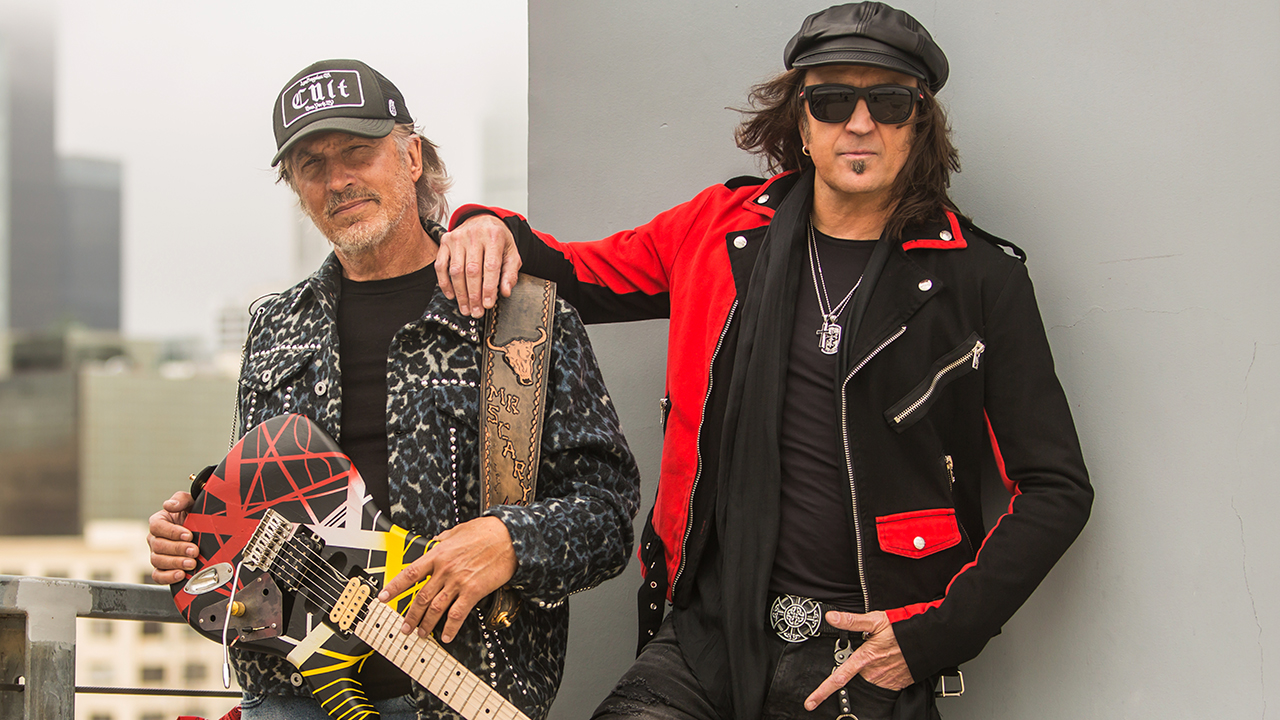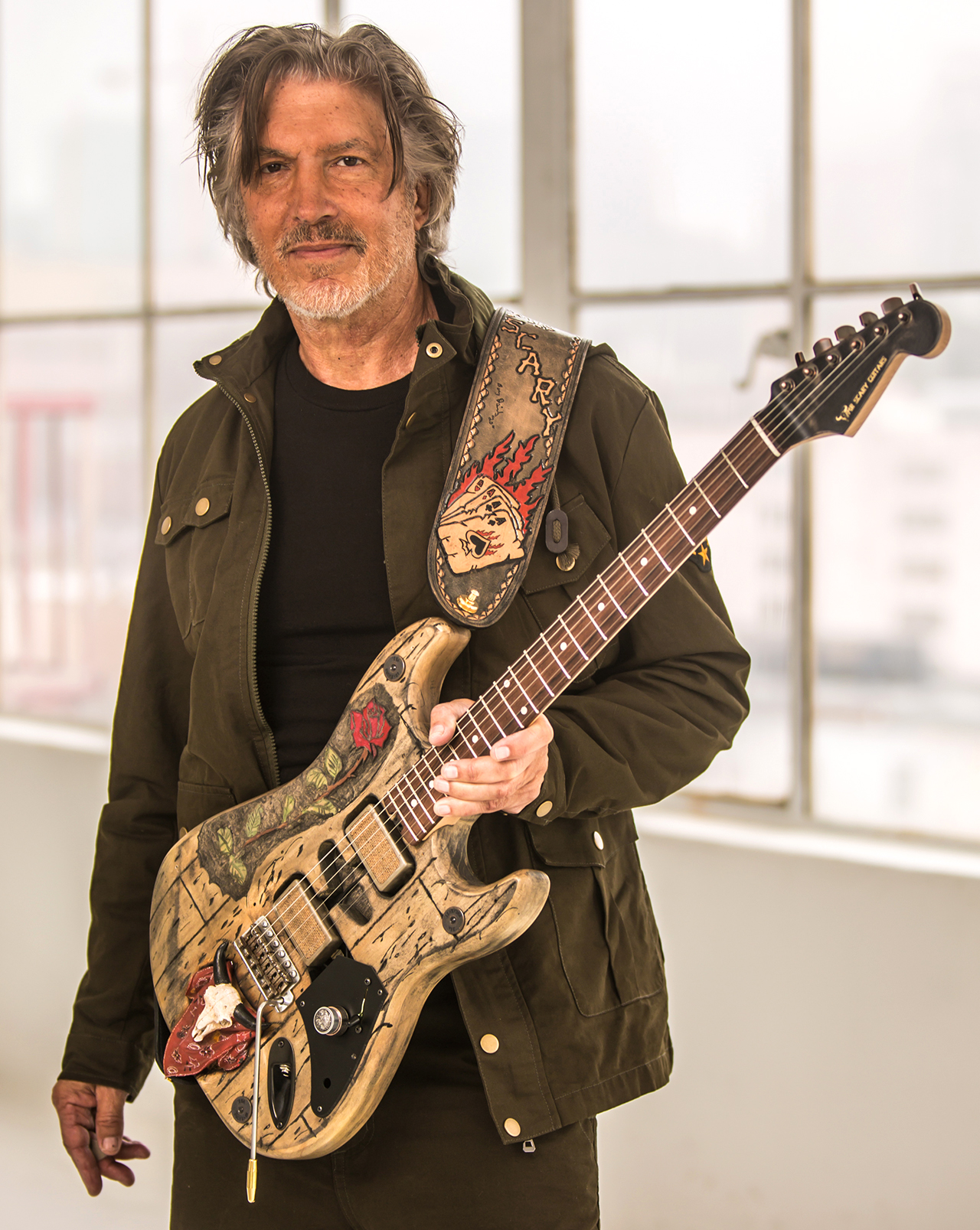
With a flurry of releases coming from seemingly every angle from two rock icons of the ‘80s, the news of Sweet & Lynch teaming up for round three should be no surprise.
Their first two efforts, Only to Rise (2015) and Unified (2017), were in keeping with the sounds heard previously with Michael Sweet in Stryper and George Lynch in Dokken. And while they came out as winners, the duo wanted more. And with their latest record, Heart & Sacrifice, they seem to have found a way to bridge the gap between the past and present.
“When it comes to George and me, we’re like polar opposites,” Sweet says. “But in most ways I think we’re very much alike. We love music. We love to work. We still enjoy and love what we do.
“We respect each other, and that has gotten us to a place where we’re comfortable enough to accept what’s expected of us while still scratching the itch to do something different.”
It seems that Lynch – with his notoriously restless creative mind – agrees: “It’s a good thing I’m wearing makeup today, otherwise you’d see me blush!” he laughs. “It’s an honor to be making music with Michael Sweet.
“I love what we’ve done before, but we’ve found this amazing middle ground here. It’s a bit like climbing a mountain and reaching the top. I think we’ve done it this time.”
While filming a video, Lynch and Sweet broke from the action to tell Guitar World about the challenges of embracing their past while remaining creatively relevant in the modern era.
What was the mindset heading into the sessions for Heart & Sacrifice?
Lynch: “This is our third record, and we wanted to make it special. But we live on opposite sides of the country, so the first two records have been done remotely, like a lot of records these days.
“With the first record, Michael had the whole band out there, except for myself, and I sent my guitar parts in remotely. Even though we’ve done our records remotely over the years, there’s still a continuity that can’t be described.”
Sweet: “This album is cool because it’s got touches of past flavors, but we’ve been able to add some modern twists in too. George and I work together so well. What we both bring to the table combines to create some great music, in my opinion. We went into this record confidently, and to be honest, I enjoy listening to this music – even though I made it.”
What new twists are you injecting into the mix?
Sweet: “When Frontiers approached me about the project they said, ‘Let’s do something that sounds like Dokken. Would you be into that?’ I don't even know if George knew that! Anyway, I said, ‘Well, if you want this to sound like Dokken, why don’t we get the real guy?’ So Frontiers said, ‘Okay, go get George,’ and it went from there.
“The sounds we were getting were harkening back to that classic ‘80s era. But this time around, in terms of new sounds, we’re working on adding some modern rock stuff, too.”
Lynch: “I didn't know that! But the idea has always been to have that classic Dokken sound. We’ve done that and it’s great – but we wanted to do more, meaning we had to find ways to add some variation.
“Maybe it’s a solo or a vocal, but really it’s us working on adding in something that sounds contemporary. People know us for the ‘80s, but we wanted more than that that this time.”
It sounds like you’re not ready to settle in as ‘legacy artists’ just yet.
Lynch: “We were forced to do that because we rested on our laurels for a second. Honestly, Michael is relentless, and it was more me in particular. I knew we needed to do another record – but we both do so many records, and each has a ton of different projects. That’s great, but what happens is that we need to be careful that they don’t start blending into one another.
Sweet: “The last thing we want to do is put stuff out just for the sake of doing so. We want this music to matter. Everything we do is like our babies; they’re these beautiful little creations that we fall in love with. I will say that the way George writes make things so easy for me, which hasn’t always been the case.”
What does your collaborative process look like?
Sweet: “Here’s the thing about George: he’s a great songwriter. He writes songs with a singer in mind, and that’s why, with almost every song that George sends to me, there’s an instant melody in my head. I’ve never had that before.
“The art of songwriting is somewhat lost these days – but not for George. So even though we’re not together all the time, George makes it so easy for me in that way.”
Lynch: “I’ve never thought about it, but I do write that way. I think it’s because, in my own head, I’m the world's greatest singer – even if I can’t sing a note!
“I’ve never been able to sing, but I’m a disciple of the world’s best in my fantasy world, like Paul Rodgers, Aretha Franklin or whatever. So when I’m writing, that’s what I hear.”

Where does the chemistry between the two of you originate?
Sweet: “I’m not trying to make him blush here, but George has always been one of my favorite guitar players. He’d be in my top five if you asked me to compile a list of my favorite guitarists at any point in my life.
“I love the passion he plays with. He has his own style that works so well for me, because it’s always been a bucket list thing of mine to play with him. How could I not be overjoyed to hang out and make music with him?”
Lynch: “I guess I have to say something nice about you now! But in all seriousness, it’s an honor to play with Michael. I’ve worked with a lot of singers, some of whom were, shall we say… problematic. But with Michael, he’s the nicest of all the singers.
“He doesn’t have what I call ‘Lead Singer Disease.’ Now, you want to have some LSD – just enough to go out on stage and own it like a boss. But there’s a destructive side to that condition, and if things get a little too rockstar-ish, they can get ugly. It’s a joy to work with Michael because he’s a great person and friend.”
I imagine working in your home studios created an easygoing atmosphere, too.
Lynch: “Oh, yeah. Having someone else in the room with you or being on a clock creates a different dynamic. If I’m working with another person watching me, I feel like I have to make them happy.
“But when I’m alone, I can chill out because I only have to answer to myself. If I fuck up, there's no consequence or weirdness. If what I’m hearing isn't sounding right, I can say, ‘Fuck it,’ and go home.”
Sweet: “I love my home studio. I like the feeling of being at home and being able to take a break when needed. Having that space to do what I do without the pressure of someone breathing down my neck is nice. There’s something to be said about getting together in a room, but I’ve gotten used to the new way of doing things too.
Lynch: “For me, this is the only way now. I’m done with big studios. That shit is for your ego and is terrible for your wallet. I used to fight with producers, and it took days to get stuff done, and it ended up being like, ‘We spent $10,000 to listen to people cry.’ And I hated that there was 50,000 miles of wire between me and my sound. A lot got lost there.”
Do any of the tracks on Heart & Sacrifice hold particular meaning?
Sweet: “My favorites are the first singles we released You’ll Never Be Alone and Miracle. I also love Will It Ever Change because it’s heavy and a bit more modern, and I dig George’s tone. It’s a killer song.”
Lynch: “I’m gonna be the wise guy here and say that the best songs on this album might be some of the ones that got rejected. But I think they got rejected because they were maybe a bit too modern for what we were doing.
“We have room to add modern touches, but we can’t deviate too far from the old-school melodic thing. We need to keep that traditional element present, so some things didn’t make the cut.
“But it’s funny – some of those songs ended up on my other projects for the same label, and I changed nothing about them!”
Did you both track guitar parts, as on the previous two albums?
Sweet: “This time around I didn’t play any guitar. I did play a bunch of rhythm stuff on our first two records, but for this one, there were so many sections that required George’s talents. And I was mostly copying George’s tone on the first two records anyway.
“We felt like we didn’t need me on guitar for this one and decided to let George do it all. So, all the guitars are George, and I stuck only to singing. I am a guitar player, but I’m just a singer in this band, and I love it.”
Which guitars did you bring to the party, George?
Lynch: “I stayed away from the old ESPs and stuff like that. I’ve been building my own Mr. Scary guitars for the last 11 years, which I used across the entire record. I really should make one for Michael, but they’re not cheap!”
Sweet: “I’ve been trying to get George to build me a guitar for years, but he only does that for rich people! And I’m not doing any endorsements; I want that thing for free!”
The overall vibe of Sweet & Lynch remains dialed into the past. Does that feel restrictive?
Lynch: “No. I don’t mind that because it’s what we came here for. We were able to add some modern touches and edges. But in the end, I restricted my focus to what I was being asked to do: provide melodic Dokken-style music. I didn’t need to expand my approach, and I don’t mind it; I’ve embraced it happily. It makes life easier.”
Sweet: “It can be challenging to re-create the ‘80s because we no longer live in the ‘80s. We’re 40 years older. We’ve changed as people and our musical styles have grown. Recapturing that sound can be very difficult. But what helps is listening to old Dokken or Stryper records. If I do that, I can somehow dial back to that place.”
Lynch: “I guess I do that too. Even when I’m making an End Machine record with Jeff Pilson, we sit and listen to old stuff to capture what we do best together. You don’t want to plagiarize yourself when making music that’s supposed to harken back. It’s more about maybe returning and remembering the things that once inspired you.”
Sweet: “It’s interesting you say that, because I feel like you tapped into your old self more on this album, George. I hear a lot more of the Dokken-era George coming out, which I thought was super-cool.
“We all know that George always tries to experiment and develop new things. And I think that’s amazing, but it’s nice to hear that older flavor too. It’s like, ‘Oh, my gosh, that sounds like 1986!’”
- Heart and Sacrifice is available now via Frontiers Srl.







